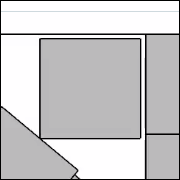|
fool of sound posted:I mean you could but the game isn't built to handle anything like that and does it very poorly. It's like saying 'chess can also be played as the story of the white and black pawns uniting to overthrow the noble pieces'. Because it's all up to the DM; nothing in any of the books is the DM obligated to abide by any of it, the DM is a story teller, the rules merely exist as a common frame of reference for taking part of a collaborative process; there are merely suggestions and guidelines. Part of the DM's job is basically being an on-the-fly game designer, to provide the players a fun experience. Think about it, is the DM literally going to tell you "No you can't do that, there aren't any written down rules for it!" if you ask if you can jump behind the bar and make drinks for everyone in the aftermath of a battle that cleared the bar? Hell no. The DM is either going to ask for a skill check, maybe a Medicine check, maybe an acrobatics check (to do the fancy drink shaking movement) and let you go hogwild. The systems in D&D are literally irrelevant if you merely wish to use D&D as a jumping off point to do something else; because everything is ultimately up to the DM and its player. Nothing, not a single rule, nothing in the PHB, DMG, or MM are sacred or sacrosanct to what constitutes D&D, you can just ignore what's there and do something else with your dice. Like D&D is not a video game, you are not obligated to abide by the rules in the book. No one is going to force you to abide by it, just talk to your DM? If you are the DM, then nothing stops you from making something up, printing a PDF and distributing it to the players before a campaign begins for comment. fool of sound posted:I think you need to reread the post I was responding to, which specifically was about campaigns that... don't do combat. Which is the only thing D&D has rigorous systems for. And I'm using the term loosely. But it's really actually that simple. Just let the DM handle how to handle the kind of adventure you want to have. If you want to dig a mineshaft and be the Dwarves from sleeping beauty and that's what the group wants to do and the DM is up for it, let him handle it as to what sort of checks it needs? I feel like easily with the existing systems you could figure it out. Mining is just a bunch of athletics checks at worst. I imagine the DM would have a lot of fun rolling luck rolls to see if the shaft caves in on itself or if you dug into a gas bubble that turns out to be an air(gas) elemental. fool of sound posted:In 5e, out of combat mechanics are 'cast a utility spell' or 'dm gives you a number to roll against, perhaps with advantage or disadvantage, with only very basic guidelines'. 3.5/4 had more defined mechanics for out of combat skills and systems, but even then by far and away the core assumption of the game and the focus of the overwhelming majority of the mechanics is on combat or navigating a dungeon to get to combat. That isn't to say it can't handle anything outside of that, but if your game is going to largely or entirely ignore that focus, then you're left with a pretty underwhelming skill and social interaction system at best. Can you suggest a example of an interaction you believe that D&D (5e) does not have a rigorous system/rules for? I think you'd be surprised at the huge variety of responses you will get.
|
|
|
|

|
| # ? May 25, 2024 00:48 |
|
I will stan Chuubo's Marvelous Wish-Granting Engine. It's written in a way that's hard to grasp, but in no other game you can get XP from signing wistfully at the sunset.
|
|
|
|
"You can just leave it to the DM" is a pretty incredible condemnation of DnD. The strength of a game system is in how the rules give the players (GM or not) structure and support. Games should make it easier to do stuff, and with DnD, you're going to be fighting the system a lot if you're not doing tons of combat.
|
|
|
|
paradoxGentleman posted:I will stan Chuubo's Marvelous Wish-Granting Engine. It's written in a way that's hard to grasp, but in no other game you can get XP from signing wistfully at the sunset. I'd like to play polaris one day, when I've found a suitable group of companions and a few carafes of impossibly delicate wine to sip from the finest of crystal flutes quote:When your character gets into trouble, which is usually (but not always) stirred up by whoever's your Mistaken, you don't immediately roll dice. You and the Mistaken will start a quick round of negotiations, using specific ritual phrases. If the Mistaken, for example, says "As Ursus reaches for his beloved, he slips on the ice floe and falls into the icy river", you can answer with the phrase "But only if..." and say something like "But only if... he sees the silver key he's been searching for under the ice". Or you can answer with the phrase "You ask far too much", and the Mistaken will have to come up with an alternative statement, so you can choose which one you like the best.
|
|
|
|
Wittgen posted:"You can just leave it to the DM" is a pretty incredible condemnation of DnD. The strength of a game system is in how the rules give the players (GM or not) structure and support. Games should make it easier to do stuff, and with DnD, you're going to be fighting the system a lot if you're not doing tons of combat. I still don't understand what 'fighting the system' looks like. Could you explain?
|
|
|
|
Wittgen posted:"You can just leave it to the DM" is a pretty incredible condemnation of DnD. The strength of a game system is in how the rules give the players (GM or not) structure and support. Games should make it easier to do stuff, and with DnD, you're going to be fighting the system a lot if you're not doing tons of combat. I feel like this is like a massive difference in terms of how one approaches tabletop roleplaying. Are you looking for basically a recreation of a computer game cough 4e has you covered cough on the tabletop with some light roleplaying on the side; or are you looking for a roleplaying system that happens to have combat? 5e like any roleplaying system lets you do anything and the fact it gives you the freedom is the entire point of tabletop roleplaying. Otherwise why not just play a computer game?
|
|
|
|
rich we had a schedule going. you were supposed to be okay today
|
|
|
|
Raenir Salazar posted:I feel like this is like a massive difference in terms of how one approaches tabletop roleplaying. Are you looking for basically a recreation of a computer game cough 4e has you covered cough on the tabletop with some light roleplaying on the side; or are you looking for a roleplaying system that happens to have combat? The point is that is a strength of roleplaying games as a genre, not D&D. Every TTRPG system lets you do whatever the gently caress you want or ignore rules or homebrew new ones. Praising D&D for that is like praising a movie for being composed of rapidly moving images.
|
|
|
|
sebmojo posted:You're not rolling a number though, you're using a disguise you stole from the costume shop to try and talk your way into the police station so you can pull the gnome thief out of the bag of holding before he asphyxiates then swap him for the political prisoner before the assassins arrive. The number is to see if it works. I would say most Powered by the Apocalypse systems are what you want to look at. The basic framework of Powered by the Apocalypse-based systems is "roll 2d6 + Stat. On a 10+ you succeed, on a 7-9 you succeed but with complications, on a 6- there are consequences and you gain experience." This basic setup means that no matter what happens, the plot keeps moving in unexpected ways. The stakes and the tension don't necessarily have to be life-and-death--there are a lot of ways to succeed, just as many to royally screw things up, and either way something interesting happens. My current favourite is Voidheart Symphony, a fantastic game about psychic rebellion against the powers that be. Here's a basic example from that system to show how PbtA works: quote:Make a Stand It's simple, not "Rollmaster-y". There are concrete effects to success and failure, so it's not just freeform. It gives the players and the GM an springboard for continuing to play out the situation. It's not about combat, but it's still an interesting way to handle things. This is a pretty bland example, but I hope it gets across the basic idea of how other systems work.
|
|
|
|
Otherkinsey Scale posted:I would say most Powered by the Apocalypse systems are what you want to look at. The basic framework of Powered by the Apocalypse-based systems is "roll 2d6 + Stat. On a 10+ you succeed, on a 7-9 you succeed but with complications, on a 6- there are consequences and you gain experience." This basic setup means that no matter what happens, the plot keeps moving in unexpected ways. The stakes and the tension don't necessarily have to be life-and-death--there are a lot of ways to succeed, just as many to royally screw things up, and either way something interesting happens. That sounds interesting. I have played and GMd *World games and they're great. I would argue that they still require a good GM to really sing because you have to come up with interesting consequences constantly. I'd also say I don't think there's that much difference between a World game and D&D with a good DM because the World rules are sort of a codification of good DMing (fail forward, don't roll for the sake of it, centre action on the players). Ultimately you're still taking your character and throwing it against the world and the DM is telling you what happens next.
|
|
|
|
Raenir Salazar posted:I feel like this is like a massive difference in terms of how one approaches tabletop roleplaying. Are you looking for basically a recreation of a computer game cough 4e has you covered cough on the tabletop with some light roleplaying on the side; or are you looking for a roleplaying system that happens to have combat? Dude c'mon, don't fall for the "4e is videogames" propaganda, that's a loving ploy to sell pathfinders to angry nerdy grognards who refuse to see a game that is actually well designed and thought over because it killed a few sacred cows
|
|
|
|
Raenir Salazar posted:5e like any roleplaying system lets you do anything and the fact it gives you the freedom is the entire point of tabletop roleplaying. Otherwise why not just play a computer game? I've not played it so maybe I'm wrong, but I don't think there's any rule in 4th edition that you're not allowed to act like your character and do out-of-combat things.
|
|
|
|
also voidheart symphony fucks and is probably the most fun i've had in a ttrpg period so, play it.
|
|
|
|
Raenir Salazar posted:I feel like this is like a massive difference in terms of how one approaches tabletop roleplaying. Are you looking for basically a recreation of a computer game cough 4e has you covered cough on the tabletop with some light roleplaying on the side; or are you looking for a roleplaying system that happens to have combat? There were no non-combat rules in 3.X or 5E that weren't also in 4E. As much as either of them were roleplaying games so was 4E.\ EDIT: Oh you're the guy that claimed 4E made wizards work like everyone else and just ignored the half dozen of posters that said "Actually no they still had their unique getting lots of spells in a spellbook and prepping spells every morning. ZenMasterBullshit fucked around with this message at 00:41 on Sep 1, 2020 |
|
|
|
sebmojo posted:I still don't understand what 'fighting the system' looks like. Could you explain? To me it's a matter of how much work the players (again, GM and PCs both) have to put in to create interesting scenes. Imagine some stereotypical confrontation in a tavern between the PCs and some a group of NPCs. If you're playing DnD, rolling initiative starts a rich interaction of rules that uses most of the stuff on the PCs character sheet. If the PCs try to talk it out, they get to use one or two of the numbers on their sheet and having interesting stuff develop is probably going to require a lot more initiative from the DM especially. Meanwhile if the same situation happens in Dungeon World, there is no difference in mechanical weight between either path, and the way the game is structured means that dramatic momentum is going to be built up. Running DnD is much more labor intensive than running Dungeon World no matter what, and running an interesting combat-lite DnD is going to be even tougher. And on the other side of the table, the players are going to lean to combat because that's what almost all the systems are built around. And lol @Salazar. Yeah any roleplaying system lets you do anything. But what does a specific system make you likely to do? What does it inspire you to do? What kinds of interactions does the system tend to prompt? These are the kinds of questions that really tell you how good or not good a system is. You could have the best gaming of your life with any system if you have a group of good players and a great DM. But a great system will foster great games even when the GM or players are off.
|
|
|
|
I liked the approach to skill checks in Costume Fairy Adventures an RPG with basically no combat mechanics and built mostly around mischeif. The way it generally worked is that you rolled your skill of whatever, and if you passed you got to describe how your attempt worked out, and if you failed the DM did (with consequences for your character). And if you're rolling against another player, whichever player won the roll got to describe the outcome. Yes, this does mean that the group is more successful when the players are squabbling. This was entirely intentional.
|
|
|
ZenMasterBullshit posted:There were no non-combat rules in 3.X or 5E that weren't also in 4E. As much as either of them were roleplaying games so was 4E.\ Yeah, 4e has fairly few non-combat options compared to almost every single RPG that isn't D&D, but literally the only non-combat options it lacks that 3e or 5e has are all magical spells, which is why that argument is hilarious, because it instantly shows you where someone's priorities are.
|
|
|
|
|
cargohills posted:I've not played it so maybe I'm wrong, but I don't think there's any rule in 4th edition that you're not allowed to act like your character and do out-of-combat things. 4e is fine out of combat, it suffers a little from the harder divide between in and out of combat, more so than other editions. The skill challenge rules were half baked, but done right they could be made to work a bit like the *world games. Wittgen posted:To me it's a matter of how much work the players (again, GM and PCs both) have to put in to create interesting scenes. Imagine some stereotypical confrontation in a tavern between the PCs and some a group of NPCs. If you're playing DnD, rolling initiative starts a rich interaction of rules that uses most of the stuff on the PCs character sheet. If the PCs try to talk it out, they get to use one or two of the numbers on their sheet and having interesting stuff develop is probably going to require a lot more initiative from the DM especially. Meanwhile if the same situation happens in Dungeon World, there is no difference in mechanical weight between either path, and the way the game is structured means that dramatic momentum is going to be built up. Thanks, these are all good points. Like I said I disagree that DnD is more work than *world games, the world games do push you to do the things that a good DM would be doing anyway but that still takes a lot of imaginative effort. I think any game has a built in slant to combat because combat is fun, it's fun to hit pretend elves in the face with your ennui or w/e. sebmojo fucked around with this message at 00:51 on Sep 1, 2020 |
|
|
|
12 years on and people are still repeating the "4e is like a videogame" idiocy. jesus christ. it's exactly as combat-focused as every other edition of D&D, but unlike 3.x and 5th ed, it's actually balanced in the combat parts. I still don't understand how anyone would want to play a fighter/ranger/rogue/barbarian/etc. in any edition of D&D other than 4th edition. Like why would you sign up for being less powerful AND having an extremely boring time in combat compared to the other players? just don't play d&d
|
|
|
|

|
|
|
|
You would love my games. e: gonna stan for the BITD system again, way better for combat when it comes up than PBTA.
|
|
|
|
I sure hope Rich is OK.
|
|
|
|
I like casting magic missile
|
|
|
|
paradoxGentleman posted:Dude c'mon, don't fall for the "4e is videogames" propaganda, that's a loving ploy to sell pathfinders to angry nerdy grognards who refuse to see a game that is actually well designed and thought over because it killed a few sacred cows It was a joke. I don't have any strong opinions about 4e other than that it wasn't for me. cargohills posted:I've not played it so maybe I'm wrong, but I don't think there's any rule in 4th edition that you're not allowed to act like your character and do out-of-combat things. I don't think I made that claim. The discussion is largely following a thread about the strengths of a system being to the extent in which it highly regulates its play. Wittgen posted:And lol @Salazar. Yeah any roleplaying system lets you do anything. But what does a specific system make you likely to do? What does it inspire you to do? What kinds of interactions does the system tend to prompt? These are the kinds of questions that really tell you how good or not good a system is. You could have the best gaming of your life with any system if you have a group of good players and a great DM. But a great system will foster great games even when the GM or players are off. The system can't make you play a combat game if you don't want it to, and the rules are sufficiently open ended enough to play any kind of game within the context of its rules. After all, aren't human beings free willed thinking rational and self interesting beings? How can rules on paper make you do something you don't want to do, especially with a willing group and DM who are willing to be flexible with those words? It doesn't really make sense to single out a system over another merely on the basis that the intended experience doesn't match your preference because there are many systems and you can always go for the system that better suits it. Does on paper at first glance does D&D seem combat focused? Of course it is, that's the design and that isn't really a flaw, it's the anthropic principle of the system. But you can do other things, plug in modules to make it more about puzzle platforming or something else. The sky is the limit, or just play something else that has more depth for the particular mechanical interaction you wish to see abstracted by systems of rules and interactions. However that being said, as mentioned D&D is plenty flexible enough to play virtually any kind of game, the encounter rules can be easily tweaked to support non-combat. Want to have a Court Drama being Literal Rules Lawyers? Initiative can reflect the order in which you speak, combat is sufficiently abstract to reflect fighting with swords to fighting with words. It only requires a minimal amount of imagination and flexibility but you can fundamentally use the core system for any experience you desire. Raenir Salazar fucked around with this message at 01:23 on Sep 1, 2020 |
|
|
|
sebmojo posted:That sounds interesting. I have played and GMd *World games and they're great. I would argue that they still require a good GM to really sing because you have to come up with interesting consequences constantly. I'd also say I don't think there's that much difference between a World game and D&D with a good DM because the World rules are sort of a codification of good DMing (fail forward, don't roll for the sake of it, centre action on the players). Ultimately you're still taking your character and throwing it against the world and the DM is telling you what happens next. I find the GM move really great for sparking creativity though - you end up working backwards when coming up with action results and it's much easier. for example: D&D: "I failed my check" *Okay, what is a plausible result of that given the current fiction* "Something not that interesting happens" AW: "I failed my test" *Okay, let's look at the list of GM moves - which of these works well given the current fictional situation. and "nothing happens" isn't there* "Okay you don't get what you want but here's an opportunity" or "You don't get what you want and here's something dangerous you discover" The thing is that in the first situation it feels like I'm doing the right thing - I'm thinking about the fictional situation and the action and it's often completely plausible that a boring result is the outcome and it's the most likely option. But there are also a heap of possibilities that are slightly lower probability but far more interesting and completely plausible - the GM move framework is basically that old improv trick of adding constraints to make creativity flow. The best thing though is that you can just steal this trick for D&D too - in practice the AW GMing moves work flawlessly if you just use them when someone fails a skill check in D&D. Fail a spot check? offer an opportunity. "you can't find the enemy but there's a good spot to observe from up that cliff". Fail to disarm a trap? There are a lot of interesting options on that list that are just as interesting as 'it goes off'...
|
|
|
|
Old Kentucky Shark posted:Yeah, 4e has fairly few non-combat options compared to almost every single RPG that isn't D&D, but literally the only non-combat options it lacks that 3e or 5e has are all magical spells, which is why that argument is hilarious, because it instantly shows you where someone's priorities are. And most of those magical spells became Rituals so they were still loving in the game. Raenir Salazar posted:It was a joke. I don't have any strong opinions about 4e other than that it wasn't for me. Dude you've made multiple posts about how 4E wasn't real roleplaying in this thread. Like...a lot of them. It wasn't a joke. At most it's not a funny one the 40th time you personally made it.
|
|
|
|
xiw posted:I find the GM move really great for sparking creativity though - you end up working backwards when coming up with action results and it's much easier. Exactly. They're codified good DM practice. I guess the argument is that while you can run D&D combat like a robot and people will probably have fun, there's no equivalent way to run D&D non-combat like a robot and still have people have fun. My counter argument is non-combat in World games can't actually be run like a robot because it requires a lot of attention and creativity, but I totally accept that it gives you a much better framework to work in and agree about stealing it for D&D!
|
|
|
|
well it's possibly more than just "codified good DM practice", like D&D spent decades floundering around with Gygax's actively bad DM advice to e.g. sic vorpal mummies on players with too much treasure there's a whole lot of social and mechanical support for playing *World and Blades in the Dark that extends beyond "there's a (lovely niche over-complicated) rule for that". the difference between the Blades skill list and a D&D skill list is that Blades has guidance for mutually(!) deciding the position (controlled/risky/desperate) and effect (great/standard/limited) of player moves, not to mention things like partial success outcomes or fail-forward. the difference between a *World move and a D&D action is that *World moves are nested so even if you forget the specific rule for the specific action, there's a layered series of other rules you can use instead without feeling like you've broken the game or tainted the outcome these are concepts that newer RPGs put front-and-centre in their rulebooks, sometimes even making them the centrepiece of the entire game. D&D, meanwhile, buries these in, what, Dragon magazine articles? 4th edition DMG2?
|
|
|
|
Lt. Danger posted:well it's possibly more than just "codified good DM practice", like D&D spent decades floundering around with Gygax's actively bad DM advice to e.g. sic vorpal mummies on players with too much treasure I mean, so I can't speak to that other system, since I've never played it but I'm a little confused about the comparison being made here. D&D's core rules at least for 5e, are all accessible, and easily so especially online if its in the SRD, while anything you'd have to "dig" for might be behind a paywall somewhere are usually always optional and don't relate to the core system at all; and certainly wouldn't relate to a key action that would break the game if you get it wrong (and any optional content should be cleared with your DM first so they can make notes and account for it if they approve it). I'm trying to determine what you talking about from context but afaik a partial success/failure seems like something that's left for the DM in D&D to eyeball as appropriate and again it seems like these are two systems with two different design goals and it isn't really an objective measurement of how well they accomplish that thing, vs simply underscoring that they carry out their design goals in different ways. Like if a player forgets a rule, the DM or other players should step in; or if a player forgets a move that would be optimal, ideally the group they are in can remind them. Another way of looking at this is if a rule interaction is hilariously broken it would be so obvious that it can be corrected via a quick ruling; the DM is also the referee in a way. While if your rules are so layered and subtle that a rule being used wrong or forgotten about might never be caught at all and no one learns going forward without that immediate feedback? It sounds like a flexible system that's easier on the DM don't get me wrong but it feels like the typical, "X and Y systems do things differently that might appeal to different people" not that "X fundamentally solves a problem with Y". Raenir Salazar fucked around with this message at 02:18 on Sep 1, 2020 |
|
|
|
If your group has to fix a problem with a game, that doesn't negate that the game had a problem and that your group had to devote unnecessary time and effort to correct it. This is not new wisdom; even in the 3e days people were referencing the Oberoni Fallacy on the official forums. ( those forums, I spent too much time there over a decade ago.) those forums, I spent too much time there over a decade ago.)Raenir Salazar posted:While if your rules are so layered and subtle that a rule being used wrong or forgotten about might never be caught at all and no one learns going forward without that immediate feedback?
|
|
|
|
Raenir you should absolutely read apocalypse world. Most of the stuff in it is very usable in other systems, and you might find you're already doing a lot of it. The core mechanic is the 2d6 one described below - roll + stat. If that totals 10 or more, sweet you did it. If you get 6 or lower boo you failed, but get an experience point to take the sting out. If you get 7-9 then you or the GM get to pick some aspects of success, with the implication that the other aspects failed. Think 'for any project pick two of fast, cheap and good'. Combats go like 'the rad-thug comes in low, slashing at you with his machete glistening with the dried blood of a dozen foes! What do you do?' 'I jump it and spin kick him in the face!' 'okay roll ... hm, 8. Okay, pick two of knock him over, avoid damage, land on your feet'. Implicit in this are the consequences (and that's what I was talking about before re creativity, you're having to come up with three balanced options on the fly constantly and it's a little exhausting as a dm) and those consequences flow on to the next player. Note that if he'd rolled a ten, he could have had all three, and looked like a badass. 'The rad thug and your friend are both flat on their backs, scrabbling in the dirt - player 2 you can see another rad thug lining up a shot! what do you do?' that's a combat example, but the same method applies to out of combat which is why I'd agree they're one of the slicker sets of games rules out. But you can totally apply the lessons of pick two from three then deal with the fallout to any system.
|
|
|
|
NGDBSS posted:If your group has to fix a problem with a game, that doesn't negate that the game had a problem and that your group had to devote unnecessary time and effort to correct it. This is not new wisdom; even in the 3e days people were referencing the Oberoni Fallacy on the official forums. ( The existence of mods I don't think imply that the original game was flawed because someone wanting a deeper experience or an extended one decided to spend effort to change it. You're drawing a causal link and assuming the conclusion here when I don't think there's a flaw in the first place. The game gives experience A, it can give you experience B with tinkering. Either because of sunk costs or familiarity someone maybe doesn't want to switch to a different system that would be better suited to experience B (Or perhaps they want to keep A but also do B); again I believe it's the strength of the system that it can with a little work also do B, I don't agree its a problem that it isn't inherently designed from the ground up to do B. For the most part I get the sense that some people actually just want experience B and not experience A at all, which again feels a little strange but maybe its because they like rolling d20's and want to stick with a brand they're familiar with okay, that's valid. But it's difficult to see how its reasonable to blame the system for not having experience B ready to give to the players who want it out of the box. sebmojo posted:Raenir you should absolutely read apocalypse world. Most of the stuff in it is very usable in other systems, and you might find you're already doing a lot of it. I haven't played a lot of tabletop rpgs, I've been Neverwinter Nights/Baldur's Gate etc for a long time and when I did finally get to start playing RPGs its basically been super recent; so I'm largely fine with sticking with the core thing that's being presented to me and then wiggling around whenever I get a strong idea for a concept in my head and then asking my DM about it (or asking the 5e thread for suggestions and then asking my DM). The way my group works is they have different games on different days and I'm in the 5e group/day, so adding anything new would be up to the DM and so it's probably not going to be a thing I could ask for them to add to it. The 5e day is basically meant for 5e, it'd have to be like a different day where it's a different system depending on who is running the game, but I only have time for like 1 D&D game a week. I like the idea of a sort of catch-up mechanic though; it also sounds like something that could be easily added ontop of 5e skill checks/dc's/attack rolls to give a more variable sense of success/failure (legendary resistances kind of suck and I don't think readily solve the problem they are trying to fix in regards to boss encounters). Where failure provides a sort of reward to encourage you to do risky things. In my recent game I jumped on a Dragon's back and got full hit by its legendary attack options so I felt like there was no difference between attacking it on foot or from above; and moves like, "I want to do a plunging attack for extra damage like in Dark Souls" and these are moves I currently feel like I don't get rewarded for despite in some cases taking considerable risks to setup the move. So yeah, believe me, I'm extremely sympathetic to the idea of having more clearcut rules to reward out of the box thinking and risky plays; especially when some things do feel like oversights where a DM could easily give me the thing but if they want to be sticklers about it, just conditions me not to do those things which I find frustrating and disappointing. But I don't think that's a problem with the game, this is the experience I signed up for where sometimes things are good and sometimes things are bad and other systems I imagine are the same but in different ways.
|
|
|
|
Raenir Salazar posted:Where failure provides a sort of reward to encourage you to do risky things. In my recent game I jumped on a Dragon's back and got full hit by its legendary attack options so I felt like there was no difference between attacking it on foot or from above; and moves like, "I want to do a plunging attack for extra damage like in Dark Souls" and these are moves I currently feel like I don't get rewarded for despite in some cases taking considerable risks to setup the move. that's an issue with player/dm expectations as well - are they there to be dispassionate referees or are they there to facilitate awesome adventures? the latter is (imo) objectively more fun but the former is also kind of satisfying when you achieve stuff despite the obstacles. Main thing is that everyone is on roughly the same page.
|
|
|
|
sebmojo posted:that's an issue with player/dm expectations as well - are they there to be dispassionate referees or are they there to facilitate awesome adventures? the latter is (imo) objectively more fun but the former is also kind of satisfying when you achieve stuff despite the obstacles. Main thing is that everyone is on roughly the same page. Exactly, part of the learning experience is also getting used to the DM and knowing what sort of expectations are appropriate as well, I joined the campaign late in the mid levels (12+) with all my experience before that being 3.5e/3.75e so it took time to realign those expectations. We're starting a new fresh campaign where I hope to have all the appropriate expectations and setup/development to make those cool plays!
|
|
|
|
I mean people are saying in this very thread that "D&D has always been about the metaphorical dungeon crawl and the Adventuring Day" and you're claiming "nuh-uh D&D totally has rules for everything" (which it doesn't unless you make them up) or "you can just make poo poo up and/or ignore the rules" (which doesn't negate the shortcomings in those rules). You have a hammer and are looking at everything like it's nails. If you want to seriously discuss game design and how it can influence play then examine other tools. Earnestly try to use them. Follow directions as a player or GM, like "follow this gameplay loop" or "renounce control".
|
|
|
|
NGDBSS posted:I mean people are saying in this very thread that "D&D has always been about the metaphorical dungeon crawl and the Adventuring Day" and you're claiming "nuh-uh D&D totally has rules for everything" (which it doesn't unless you make them up) or "you can just make poo poo up and/or ignore the rules" (which doesn't negate the shortcomings in those rules). You have a hammer and are looking at everything like it's nails. If you want to seriously discuss game design and how it can influence play then examine other tools. Earnestly try to use them. Follow directions as a player or GM, like "follow this gameplay loop" or "renounce control". Okay, people aren't merely claiming D&D has always been about the dungeon crawl. If the position was merely and solely "D&D is best for dungeon crawling" I wouldn't have said a thing. The way you're saying it implies its a strength of the game, and that's not the context I am responding to. As an (but not the sole) example: Zetetica posted:Itís not just XP, the entire concept of leveling and characters in D&D/OotS is also designed around the expectation of combat. V can likely find mundane uses for some new spells but how much is Roy or Haley really getting out of a new level that isnít about improving their fighting prowess? Two additional ranks in knowledge (architecture)? This to my mind isn't saying that D&D is best for combat, but also making a value judgment that the rules lack being able to do things other than combat, in which I am making the case that you can pretty easily use the core mechanics of the game to do non-combat.
|
|
|
|
You're missing the forest for the trees; as of recent editions the combat encounters and connected stuff are the metaphorical dungeon crawl. So that quote is entirely correct. You're propping up this enormous argument about easily hacking the game on the word "easily", which falls apart if you actually look at what the rules and guidelines talk about. Again, go out and examine other games.
|
|
|
|
NGDBSS posted:You're missing the forest for the trees; as of recent editions the combat encounters and connected stuff are the metaphorical dungeon crawl. So that quote is entirely correct. You're propping up this enormous argument about easily hacking the game on the word "easily", which falls apart if you actually look at what the rules and guidelines talk about. Again, go out and examine other games. Gesturing vaguely at unspecified other games and making unsubstantiated comparison isn't an argument and doesn't convey anything meaningful about game design. You're not making sense here, what metaphorical dungeon crawl, what are you on about. I can't see how any part of this discussion actually follows under game design at all and you haven't explained or supported that notion. Yes, no one is denying that any system of rules will encourage certain behaviours through their incentive structures, this isn't something I am fundamentally denying; I am however saying it's quite the large and unreasonable leap of logic to suggest that this means non-combat encounters aren't supported, or take some unreasonable amount of effort to add to your game, or that it is a fundamental problem with the game's design that it doesn't inherently suggest some unspecified non-combat means of playing D&D as the first go to; because that is up to you and the DM to work out. You're argument relies on ignoring that the DM and player interaction is a fundamental part of the game's design rather than being embraced as it correctly has been to flesh out any gaps in the rules. There are aspects of this discussion that rely on certain assumptions and I don't agree with those assumptions. e: Additionally I don't think you understood what I saying in respect to that quote at least in 5e a hypothetical Haley and hypothetical Roy can do anything their players want them to do. Maybe Not!Roy wants to take on an apprentice, maybe Not!Haley wants to start up her own thieves guild. These are easily accommodated for and use their existing skill checks to handle the myriad social interactions to get that happening. So that quote is not correct unless by "metaphorical dungeon crawl" you're also including or considering non-combat social interactions in which case I've completely lost track of what you're arguing or how it's a problem. It's not an enormous argument, it's a simple argument. "I don't think it's a problem, talk to your DM if you want to do more things in 5e then what the RAW rules say, if that isn't satisfying find a different group or play a different game." If I don't like CoD, I play Battlegrounds maybe if I want something more realistic. If I want something more arcadey play Borderlands. CoD being Cod isn't not an indictment of itself just because Spec Ops the Line exists. Raenir Salazar fucked around with this message at 05:10 on Sep 1, 2020 |
|
|
|
I think it's fair to say that a game is about the thing that the vast majority of the rules of the game are about. Take two hypothetical ultra simple RPGs. Game 1: "When you try to do a thing, flip a coin. On a heads you succeed, on tails you fail." This is a game about anything you want it to be about. It presents a single resolution mechanism that can be used equally effectively in anything you want it to do. Game 2: "When get into a fight, flip a coin. On a heads you win the fight, on tails you lose the fight." This is a game about fighting. You can certainly describe your character doing other things, but it's not really a game with rules any more when you do. That's two people sitting around a camp fire and telling each other stories. Which is fine, if that's your thing. Freeform storytelling has its place. But it's a different thing than a game.
|
|
|
|

|
| # ? May 25, 2024 00:48 |
|
This is really a simple issue. D&D has very codified functional rules for some things and not for others. That provides an incentive structure. What things have rules and what don't always constitutes a set of incentives and disincentives. In D&D, skill checks are nebulous and poorly defined. Magic is not. Players will generally lean towards things that are known to work over those that are not. That is what the rules condition people to do. By devoting more word count to non-combat rules and systematizing DM/player interactions in those arenas, they encourage different behaviors.
|
|
|






































